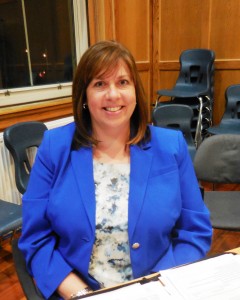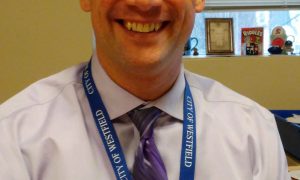Counselors discuss social, emotional health of students

Susan Dargie, WPS director of curriculum and instruction.
WESTFIELD – As students swim through a sea of changes because of the pandemic, some are rising above the waves while others are barely wading through.
School adjustment counselors Kristine Hupfer from Westfield Technical Academy, Kate Fahey from Franklin Avenue Elementary School, and Karl Michalik from Westfield Middle School recently gathered on Google Meet to talk about how students are faring with all the changes due to the coronavirus.
“I’ve seen a little of both. Some students have surprised me in their resilience, some are thriving. They are here for shop, and home for academics on remote learning. Others are struggling immensely for a variety of reasons,” said Hupfer, adding that freshmen who are new to the school are especially struggling with having to self manage their schedules.
Fahey said she works with students in kindergarten through grade four. “They’re young, so a lot of how they’re doing depends on how things are going at home; how it’s impacting people at home, whether parents are out of work, whether adults are talking to them about what is happening now,” she said.
Fahey said in school, some of the stress is from how separate students have to be. She said the focus on mask wearing and hand washing, is time taken up that would have been for learning or socializing. “Recess is hard to understand. We’re trying to be as creative as possible,” she said.
Fahey said she goes to the Boys & Girls Club every Friday to see some of the kids that are doing remote learning at the club. “They are so happy to see us in person. The most outstanding feature since last spring is students are starting to think about things they appreciate in school,” she said.
Fahey did say the switch from last spring to this fall in the focus on academics is causing some stress. “Last spring, we were checking in on how kids were doing emotionally; now, we’re focussing on school. The academic pressure is greater from an elementary school perspective. That change has been hard,” she said.
Hupfer agreed that for the students doing their academics remotely, the pressure is intense
“It’s the same at the Westfield Middle School level. What I’m hearing from many of the students is they are finding that the teachers are being very patient and understanding, and making a conscious effort to not overload them,” Michalik said.
“There are a certain level of students that have been able to go with the flow. I’ve seen a lot of students that truly have adapted to it. I love seeing it,” Michalik said, adding that middle school students are in a world of their own.
“Some students have thrived in our new normal, and proved to be very resilient. More are just rolling with it,” said Hupfer, adding, “Some things have indicated that everyone is not okay.” She said she is seeing some uptick with anxiety and isolation.
Michalik agreed, saying one student told him that the isolation is doing a number on them. “At Westfield Middle School, with a lot of the students that I see, those who were struggling before COVID, I’m seeing a similar pattern. They are still struggling, with new struggles added within their world.”
Michalik said he is happy to be seeing that some students, now that they’re back to school in the cohort model, are feeling more comfortable with the reduced population in the school. They’re finding smaller classrooms of 8 to 10 students instead of 20 or more, more calming and easier to access help. The hallway is not as chaotic. Before when the bell rang, 800 kids would be all over the place, he said.
“Amongst all the negatives that have occurred, some good things have come out of it. It’s great to hear students who can say they can actually ask for help and get immediate help,” Michalik said.
“Things have settled down; they are much calmer. Not chaos and busyness. When meeting with students, they’re much more present and engaging. I don’t know if that’s because of the shutdown and (less) human contact. They’re much more grounded,” Hupfer agreed.
Fahey said for elementary students, their whole world is at home and at school, and for some, a church connection. She said last spring, when they lost this important connection to school, which for many elementary students is their only ability to socialize, it was really, really hard.
She said it’s been helpful having a pretty established PBIS (positive behavioral incentives and support) program, and with it a whole school climate and structure, and a common language.
Fahey said last year, when the school first shut down, they did a lot of “old school” whole group interventions, like picking a student and having the whole group guess what is their favorite flavor of ice cream. She said that really worked, because it united the group and spotlighted individuals. She said now it’s trickier working around academic schedules.
“Teachers are working so hard to make it happen, with 15 kids in class, 16 kids onscreen, and teaching both alone in a classroom. It’s been a really hard time for teachers. I’ve never seen people work harder in my life. In some ways, they are more isolated than ever,” Fahey said. She said she gives one of her teachers a gift every Friday in acknowledgement.
Hupfer said WTA is doing well having the shop students in school, and they’ve been very fortunate. “I would agree these teachers are working really hard, they’re out on the front lines and ready to go. Academic teachers are here as well. I feel bad for them, too, having students on screen all day long.”
Michalik explained that for teachers, including himself, who have been doing a job for a number of years and have established a routine, “this has changed everything. You’re doing a job completely differently than what you’re used to. I’m not huge on technology, I’ve had to get used to it. This is what people are having to do. It’s the newness that we’ve had to adapt to. It’s been difficult, It’s a slow process, but it’s working,” he said
Asked how parents can best support their kids through the changes, Fahey said the district has virtual libraries with a number of social-emotional learning videos that kids can watch, such as Inner Explorer. “We do a lot of mindfulness practice here at school,” she said, adding, “Our students get a lot out of that. Almost every class is using it at various times of day.”
Director of Curriculum and Instruction Susan Dargie, who joined the call, said Inner Explorer is a resource available for families in the district to fully access at home. On the registration link, click on For Families and select their school from the dropdown menu at https://xp.innerexplorer.org/compass/westfield There is also an instructional video that explains the process at https://youtu.be/XlVElNy20B0
“Mindfulness gives students a practical tool to help enhance their sense of wellness and better manage stress. Practicing daily has been shown to reduce anxiety and agitation and improve coping skills, emotional regulation and resilience,” Dargie said, adding that families can contact the Curriculum Office for more information at 413-562-2298.
Hupfer said high school age students are not feeling as connected as they once did. She said for families, finding those moments to connect is more important than ever, even if it’s just watching a family film for a couple of hours. She said students are craving those connections..
Michalik agreed. He said it’s important being with your family and utilizing that time, even if it’s watching a movie or playing a game of UNO. “Because the holidays may look different, with families not travelling, and not seeing grandma and grandpa, using the time you have to be together as a family, taking advantage of that, playing games, watching a movie. Getting back to that simplicity of life,” Michalik suggested.
Michalik said he has one family with a middle school student and several elementary school students. “It’s chaotic for a parent right now, probably more difficult If you have more than one kid, it is a full-time job,” he said.
Fahey said she knows parents really are struggling, but are doing an amazing job, and working really hard to make the learning happen. “It’s amazing,” she said.







